Batch cooking can slash your grocery bills by up to 40% while giving you a steady supply of healthy, homemade meals. You'll save time by cooking once and eating twice, transforming a single session into two weeks' worth of dishes. Smart bulk shopping helps you stock up on ingredients at lower unit prices, while proper storage containers keep everything fresh and organized. Through strategic meal planning and energy-efficient cooking methods, you'll cut both food waste and utility costs. With the right equipment and techniques, you'll master the art of efficient meal preparation that transforms your kitchen into a money-saving powerhouse.
Why Batch Cooking Makes Sense
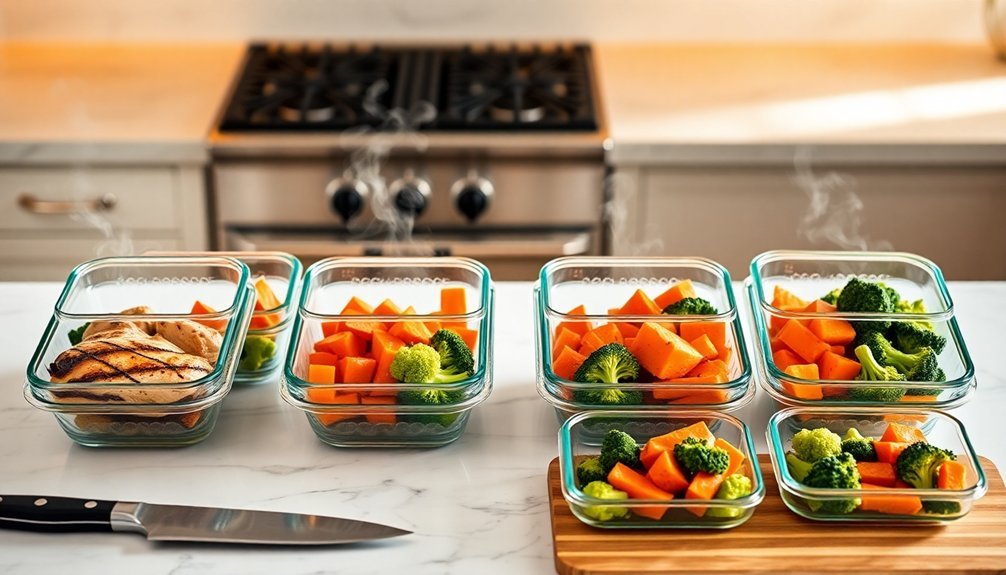
While many people struggle with daily meal preparation, batch cooking offers a practical solution that transforms how you approach your weekly meals.
You'll save significant time by cooking multiple portions at once, reducing your daily kitchen duties to simple reheating. Instead of cooking from scratch every day, you can dedicate a couple of hours to prepare meals for the entire week.
This efficient approach doesn't just save time – it's also financially smart. You'll cut your grocery bills by roughly £1,100 annually through bulk purchasing and planned shopping. Using a First In, First Out storage system helps minimize food waste and ensures proper rotation of your prepared meals.
You'll waste less food by portioning meals properly and freezing extras before they spoil. Best of all, you'll enjoy nutritious, homemade meals every day, maintaining control over ingredients while avoiding preservatives and artificial additives found in store-bought alternatives.
Smart Shopping for Bulk Ingredients
Before diving into batch cooking, you'll need to master the art of bulk shopping. The bulk section of your grocery store offers an impressive variety of ingredients, from multiple types of rice and grains to specialty items like seaweed granules and slippery elm bark powder.
You'll find significant savings when buying in bulk, with spices costing as little as 25 cents compared to $4 in packaged jars. Fresh ingredients are typically restocked daily or every two days, ensuring quality. You can even grind nut butters on the spot for maximum freshness. Many stores offer 10% case discounts when purchasing full bags or cases.
To shop effectively, compare unit prices rather than ticket prices, and consider splitting large purchases with friends.
Keep an inventory list to avoid duplicate purchases, and take advantage of store loyalty programs to maximize your savings.
Essential Equipment and Storage Solutions
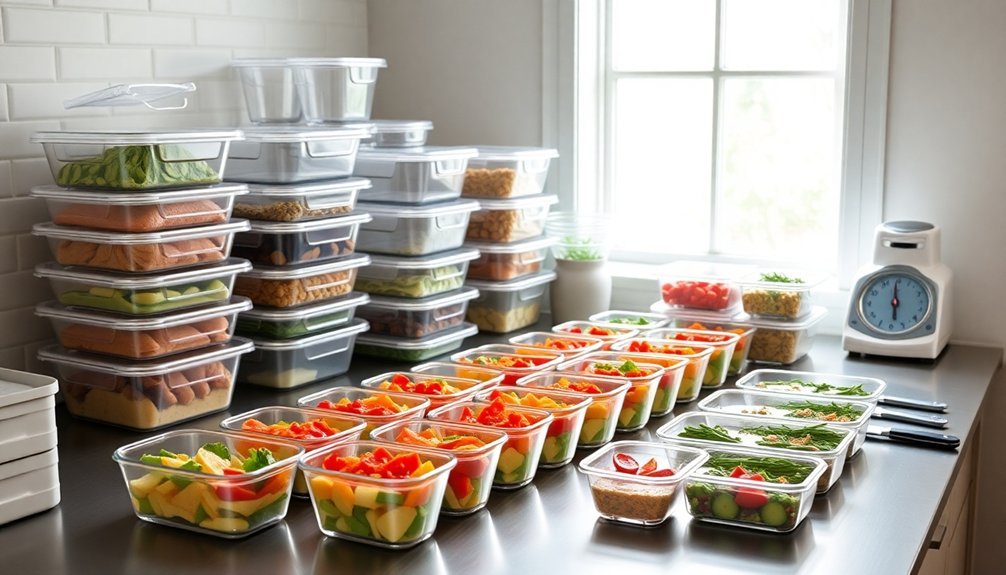
You'll need a reliable set of storage containers, including freezer-safe and airtight options, to keep your batch-cooked meals fresh and organized.
Your kitchen should be equipped with essential freezing tools like vacuum sealers and heavy-duty freezer bags to prevent freezer burn and extend food preservation. A slow cooker will help streamline the cooking process while freeing up your time for other tasks.
Space-saving tools such as stackable containers, nesting bowls, and collapsible strainers will help you maximize your kitchen space while preparing and storing large batches of food.
Storage Containers and Materials
Selecting the right storage containers and materials forms the foundation of successful batch meal preparation. You'll want containers that are airtight, leak-proof, and versatile enough for your storage needs.
While plastic containers are budget-friendly, consider investing in glass or stainless steel options for their durability and eco-friendly benefits. Using environmentally friendly containers helps reduce waste while ensuring food stays fresh longer.
For maximum efficiency, choose stackable containers that fit your portions perfectly. Mason jars work well for soups and sauces, while 3-compartment containers are ideal for balanced meals.
Don't forget portion cups for dressings and condiments. Whatever you choose, make certain they're dishwasher safe and freezer-friendly.
Label your containers clearly with contents and dates to maintain organization. If you're concerned about plastic, silicone storage bags offer a flexible, reusable alternative that's both microwave and freezer safe.
Freezing Equipment Essentials
Successful freezer meal prep relies on three core equipment categories: cooking vessels, preparation tools, and storage accessories.
You'll need stockpots, roasting pans, and slow cookers for efficient cooking, while sharp knives, cutting boards, and food processors make ingredient prep faster.
For storage, invest in freezer-safe containers with tight-fitting lids and high-quality freezer bags to protect your meals.
- Use labels to track contents and dates, preventing the frustration of mystery meals in your freezer.
- Consider baggy holders to make filling storage bags easier and prevent spills during the packaging process.
- Invest in cooling racks to guarantee proper freezing and prevent food from sticking together.
These tools will streamline your batch cooking process and help maintain food quality during freezer storage.
Space-Saving Kitchen Tools
Three innovative approaches can maximize your kitchen space while maintaining functionality for batch cooking: stackable containers, collapsible tools, and multi-purpose equipment.
You'll find stackable storage containers essential for organizing prepared meals while saving cabinet space. Invest in collapsible colanders, mixing bowls, and measuring cups that fold down when not in use. These space-saving tools help you maintain an organized kitchen without sacrificing functionality.
For multi-purpose efficiency, choose nested dinnerware sets and sheet pans that serve various cooking needs. Silicone containers work double duty – they're perfect for both cooking and freezer storage.
When selecting your tools, prioritize items that can handle multiple tasks, like a Dutch oven that works for both stovetop cooking and baking. Remember to label everything clearly using reusable freezer bags for easy meal identification.
Time-Saving Meal Prep Strategies
You'll save countless hours in the kitchen by embracing the "prep once, eat twice" approach during focused weekly prep sessions.
Your time investment in chopping vegetables, cooking proteins, and preparing grains on a single day will transform into quick, stress-free meals throughout the week.
Smart ingredient organization keeps everything visible and accessible, making it easy to assemble healthy dishes when you're pressed for time.
Prep Once, Eat Twice
Making the most of your kitchen time requires strategic meal preparation that transforms single cooking sessions into multiple dining opportunities.
You'll save time and energy by cooking proteins and carbohydrates in bulk, then repurposing them into different meals throughout the week. Roast a whole chicken for Sunday dinner, then use the leftovers for tacos, salads, or sandwiches.
Cook extra rice or quinoa to pair with various proteins and vegetables for diverse meal combinations.
- Batch cook versatile proteins like chicken, lentils, or tofu that you can easily transform into different cultural dishes.
- Prepare large quantities of grains and vegetables that work well in both hot and cold applications.
- Use sheet pan cooking to simultaneously prepare multiple meal components while minimizing cleanup time.
Quick Weekly Kitchen Sessions
Successful batch cooking hinges on dedicated weekly kitchen sessions that maximize your time and effort. Set aside a few hours to prep multiple ingredients simultaneously – wash and chop vegetables, cook proteins, and prepare grains in bulk. You'll find this approach far more efficient than daily meal preparation.
Make the most of your kitchen tools during these sessions. While your slow cooker simmers a hearty stew, you can boil rice and shred chicken using your mixer.
Store prepped ingredients in airtight containers, and don't forget to portion and freeze extras for future meals. Keep your menu flexible by preparing versatile ingredients that work in various dishes – your cooked chicken can become tomorrow's salad, wrap, or stir-fry.
This systematic approach transforms chaotic daily cooking into streamlined meal preparation.
Smart Ingredient Organization
Organized ingredients form the backbone of efficient meal preparation. You'll save time and reduce stress by storing your pantry items in clear containers with labels, while keeping your fridge systematically arranged for easy access.
Take regular inventory to avoid buying duplicates and remove expired items to maintain an efficient kitchen space.
To maximize your ingredient organization and storage:
- Store prepped vegetables, proteins, and grains in airtight containers with clear labels, making them easily accessible for multiple meals throughout the week.
- Use your freezer strategically by storing batch-cooked proteins, vegetables, and complete meals that you can quickly reheat when needed.
- Group similar ingredients together in both your pantry and fridge, ensuring you can locate items quickly and track what needs replenishing.
Energy Conservation While Cooking
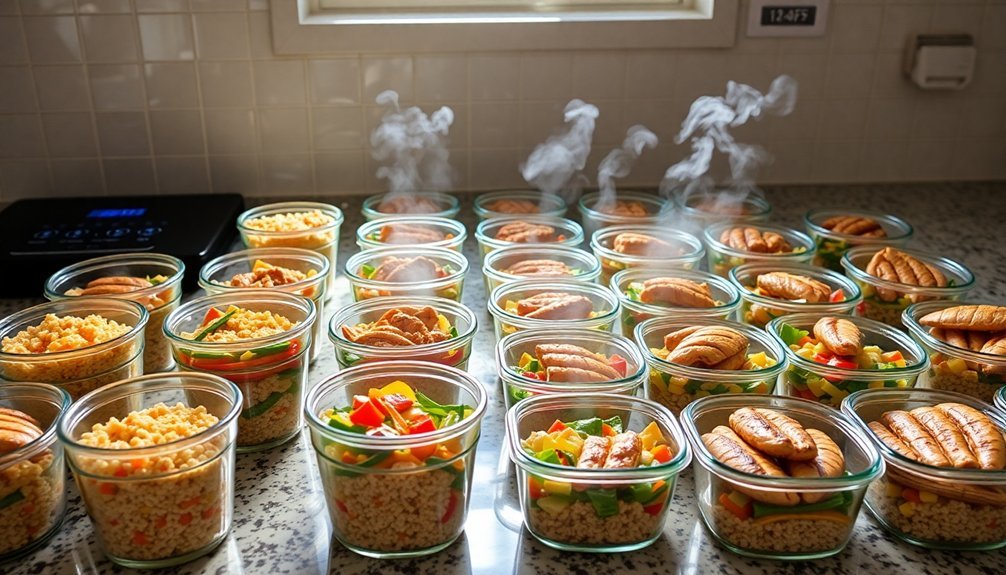
While preparing meals in batches can save time, implementing smart energy conservation practices during cooking can greatly reduce your utility bills and environmental impact.
Keep lids on your pots and match burner sizes to cookware – using a small pot on a large burner wastes 40% of the heat. You'll save energy by choosing flat-bottomed cookware made from conductive materials like copper.
Make the most of your oven by cooking multiple dishes at once and using glass or ceramic containers, which let you reduce temperature by 25 degrees.
Don't peek into the oven unnecessarily, as each opening drops the temperature considerably. For smaller portions, opt for energy-efficient alternatives like microwaves or toaster ovens, which use up to 80% less energy than conventional ovens.
Consider slow cookers for tough meats and dense vegetables.
Monthly Savings Through Batch Methods
Implementing batch cooking methods can dramatically reduce your monthly food expenses through strategic planning and bulk buying. You'll save considerably by purchasing ingredients in larger quantities and preparing multiple meals at once.
By cooking in batches and freezing portions, you'll minimize food waste while creating convenient, ready-to-eat meals that prevent costly takeout purchases.
- Transform a single cooking session into two weeks' worth of meals by prepping marinades, browning meat, and assembling dump meals for the freezer.
- Cut your grocery bills by up to 40% through strategic bulk purchasing of staple ingredients and seasonal produce.
- Maximize savings by planning recipes that share common ingredients, ensuring nothing goes to waste.
When combined with smart shopping strategies and careful meal planning, batch cooking methods can save you hundreds of dollars each month.
Frequently Asked Questions
How Long Can Batch-Cooked Meals Safely Stay in the Freezer?
You can safely store your batch-cooked meals for up to six months in the freezer, though you'll get the best quality within 3-4 months. Keep them at 0 degrees or lower for safety.
What Meals Don't Freeze Well and Should Be Avoided in Batch Cooking?
You'll want to avoid freezing meals with rice, pasta, potatoes, cream-based sauces, or raw vegetables. These foods often become mushy, lose texture, or change flavor when frozen and reheated.
Can You Batch Cook if You Have a Small Freezer?
Yes, you can batch cook with a small freezer! Focus on smaller portions, remove bulky packaging, use space-efficient freezer bags, and utilize your fridge for shorter-term storage of prepped ingredients and meals.
How Do You Prevent Freezer Burn on Batch-Cooked Meals?
You'll prevent freezer burn by wrapping meals tightly in multiple layers, removing all air from containers, using freezer-safe bags, and maintaining a consistent 0°F temperature. Don't thaw and refreeze your prepared meals.
What's the Best Way to Reheat Frozen Batch-Cooked Meals?
For best results, you'll want to thaw your frozen meals in the fridge overnight, then reheat thoroughly in the oven or microwave. Remember to stir occasionally and check that it's heated evenly throughout.
In Summary
Start batch cooking today and you'll quickly see the benefits stack up. You're not just saving money on groceries and energy bills – you're investing in your own time freedom. By dedicating a few hours each week to smart meal prep, you'll slash your daily cooking time, reduce food waste, and watch your monthly food budget shrink. It's a practical solution that delivers both financial and lifestyle rewards.
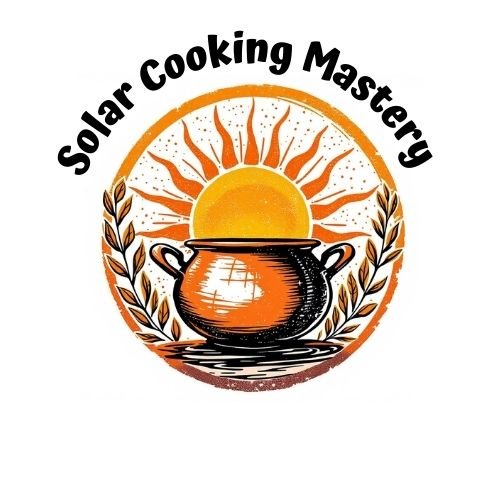
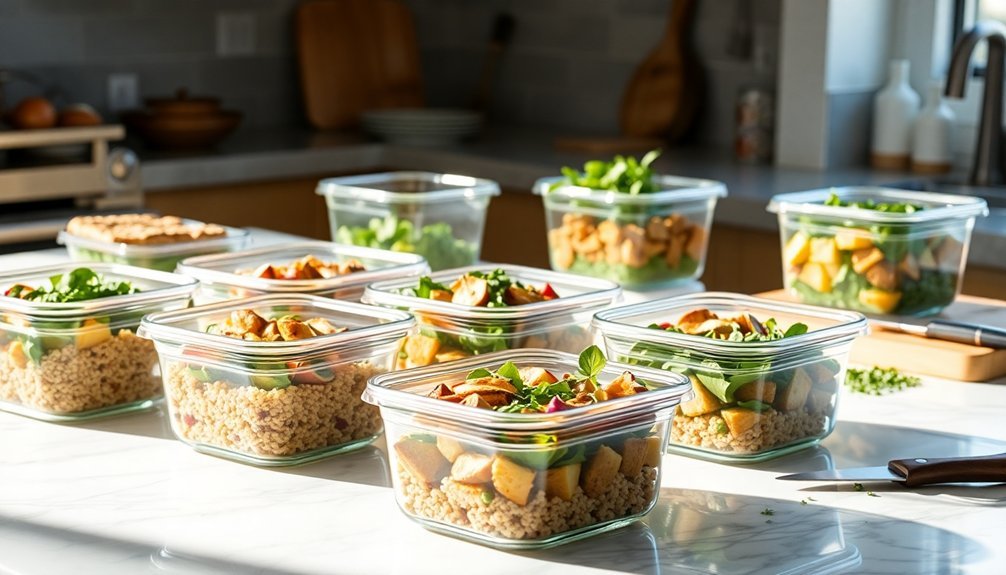
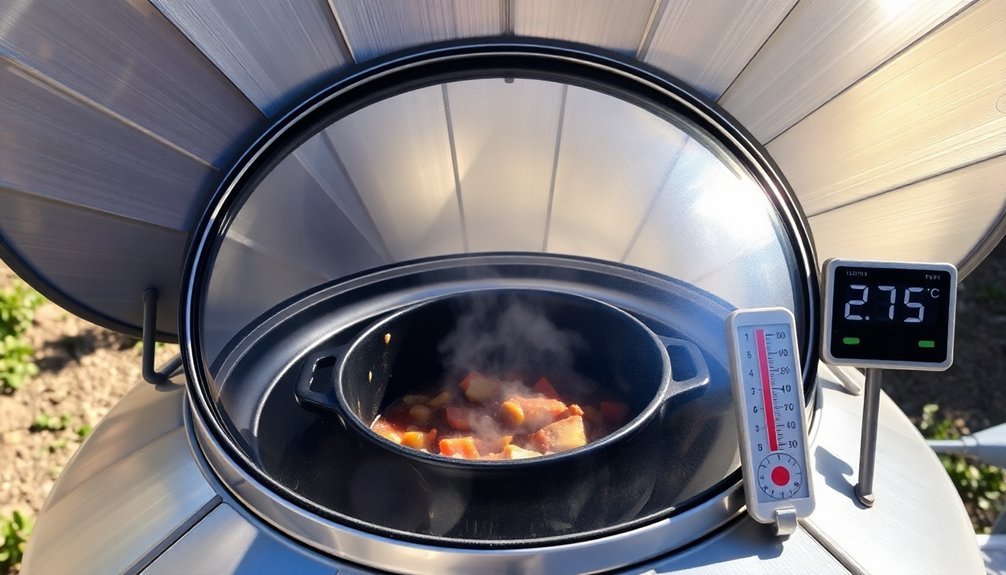
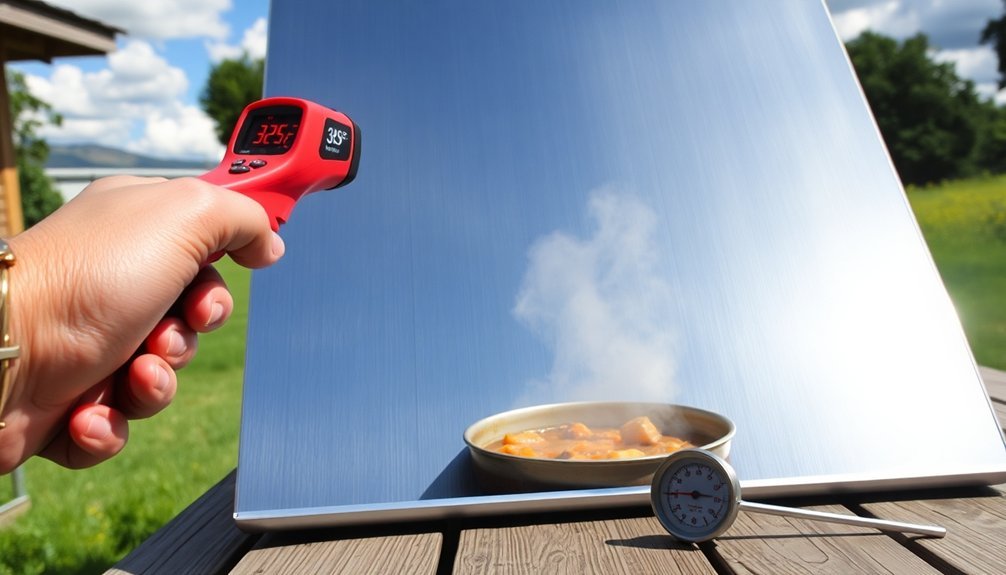
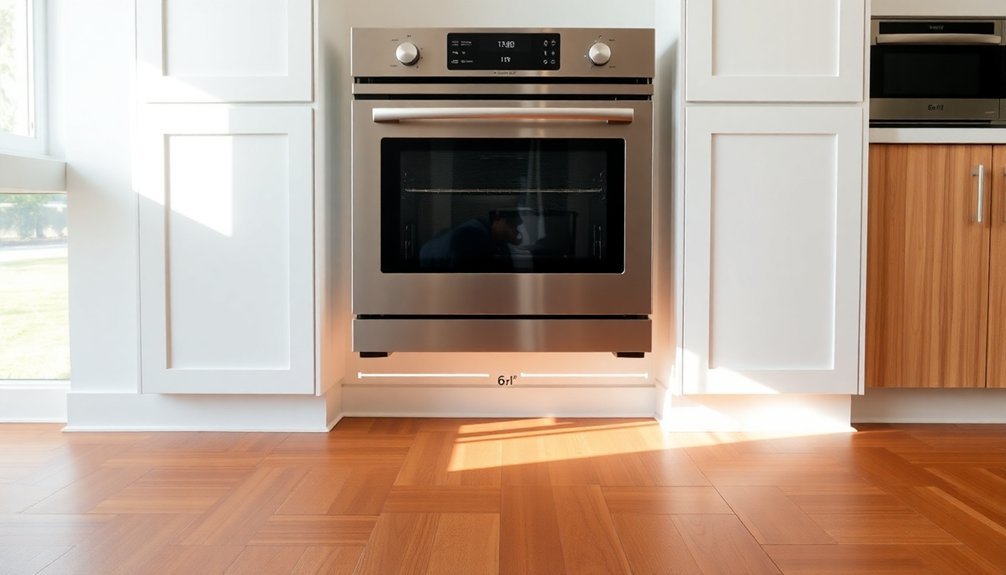
Leave a Reply